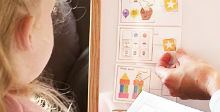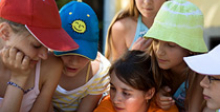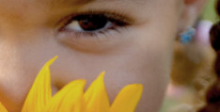Internal mini form
Contact Us Today
A guiding light

How many times in life would an individual have liked to talk about their experiences with someone whose path in life is very similar to his or her own? The answer is likely to be often.
Finding someone who fits that bill – especially if a young person is coping with disability during his or her formative years – can sometimes seem like an unreachable dream. But such a person does exist – he or she is called a mentor.
Mentorship, which is defined as the act of sharing one’s own experience in service to another, is considered a professional asset in the business world. A mentor is often someone that is involved in the same kind of work and can share how experiences and learnings, what they did to achieve their goals, and how they maintain their current level of success.
The concept of mentoring is applicable in other aspects of life, as well. Big Brother/Big Sisters of America, the most prominent mentoring program in the United States, works in this manner. The National Mentoring Partnership, or MENTOR, is the nation’s leading youth mentor organization in the United States, lists more than 5,000 mentoring programs and volunteer centers that serve over three million children in 50 states.
A good mentor in the best of circumstances is an excellent listener that can develop a personal connection with a young person. It’s essential that a mentor have some basis for understanding a child’s experiences; often, sharing the same set of circumstances or conditions can be a powerful example of hope and achievement.
Though mentorship has proven to be an effective strategy in helping young people learn about themselves, it goes without saying that individuals with disabilities could benefit by having a mentor.
What a mentor does
Mentorship can take various forms. Most often, a mentor is someone that meets with a young person regularly for talks or activities, a typical outing might be strolling through to a local park to have some fun and conversation about what is happening in the young person’s life. Other examples include, education mentors, day-to-day living mentors, sport mentors or workplace mentors.
The mentor’s job, essentially, is to share guidance. As a friend, trusted advisor and a coach, the mentor can share their perspectives on several topics, such as making friends, how to develop hobbies, bullying, and how to handle insensitive remarks and deeds. When the mentor shares his or her successes, a child can apply those principles to his or her life.
If a teen, for example, feels she may never have the opportunity to go to college or get married because he or she has a disability, and she meets a woman that uses a wheelchair that is a college-educated career woman with a husband and family, this sends a hopeful message. A child can then reasonably say to themselves, “It’s possible to have these things, and it’s okay to dream.”
Mentors offer a child a chance to discover their personal strengths, and work on their weaknesses by looking at someone else’s experiences. As a child receives guidance on going to school, making friends, discovering activities and interests, and sustaining medical and therapeutic treatments when he or she is likely to desire information from a credible source.
That’s not to say that an able-bodied person, if they are familiar with issues that affect people with disabilities, cannot be valuable mentors. It just means that sometimes, a child may need to talk about situations with someone they trust with whom they share similar experiences. Because parents and family members are not coping with a disability, they cannot provide that perspective, no matter how much they try to fill that role.
“I was lucky enough to have a mentor. She understood things my family could not. I could talk to her about anything…even the things I will never share with my family because I don’t want to hurt them,” said Catherine Lovano, an adult with Cerebral Palsy. “A mentor would benefit your child. We are out there.”
The value of a mentor
Although there is a lack of research on the number of children with disabilities that have a mentor, it’s hard to quantify how successful mentoring can be in the life of a child with disabilities. But mentoring has been studied by organizations that provide statistics on children, in general, and the results are clear.
The nonprofit group Big Brothers Big Sisters of America assessed that children with a mentor are 52 percent less likely to skip a day of school, and 46 percent less likely to use illegal drugs. A study called “Mentoring: A Promising Strategy for Youth Development” by Child Trends, a nonprofit group that examines the needs of children and seeks to identify ways to improve the lives of young people, determined that mentoring helps a child develop socially, promotes the development of positive relationships, and cultivates better attitudes towards school.
Generally, children with disabilities face a different subset of challenges that those than those that are economically at-risk, but there’s no reason to believe that the increases in self-esteem seen among at-risk children cannot be replicated among those with disabilities.
According to MENTOR, although children between the ages of 9 and 15 are at-risk for a variety of risky behaviors, they are also at a life stage when preventative intervention is most successful. Children of this age are capable of envisioning, and plotting for, a way in which to reach their goals towards a positive and productive future.
Concepts that adults can share with young people – goal-setting, work ethic, problem solving, coping with stress, developing relationships and encouraging friendships – are universal to all children.
Finding a mentor
For parents, allowing a mentor in a child’s life can be an experience that is both exhilarating and intimidating. Speaking with an adult that has a disability can be cathartic for both a parent and a child.
Issues that will need to be ironed out ahead of time include how and where a child will spend time with a mentor, what activities they will take part in, and how much time a mentor will spend with a child. But the biggest obstacle of all is the most obvious: How do I locate a mentor?
Professional groups and nonprofits have mentoring programs in place to help young people, but within the disabilities community, matching up children and mentors is a thorny task because there is no organization that serves as a nerve center for such an undertaking.
The best sources to find a mentor that a child can relate to are local organizations. One place a parent can start is the myriad of local nonprofits that serve the disabled community, such as Easter Seals, The ARC, and United Cerebral Palsy. At MyChild™, we’ve compiled a list of organizations that have local offices that might be able to recommend a program, or an individual. To obtain the list, please call (800) 692-44533 and ask for a list of community organizations which may have mentor opportunities.
The wonder of modern technology can also connect mentors and mentees. Social media sites like Facebook and Twitter may provide introductions to people in a given community that may lead to potential relationships.
A person that can be trusted is a gift in life, and through a network of family and friends, that can be easily achieved for most children with a disability. But finding a person that understands a child’s concerns at a personal level, because they have had those same issues, is an asset that can be immensely beneficial. Consider finding a mentor, today.

Relationships and Cerebral Palsy
There’s an old saying that the measure of a person’s life is measured by how much they are loved. There’s no doubt about it: our relationships with others are the cornerstone of our ability to thrive and enjoy life. Relationships allow us to explore all of the facets of giving and receiving love, from the patient and protective concern shown between a parent and child to the fire and chemistry that happens between friends, mates and spouses. And the level of ability has nothing to with the level of love one is willing to give to or receive from another.








